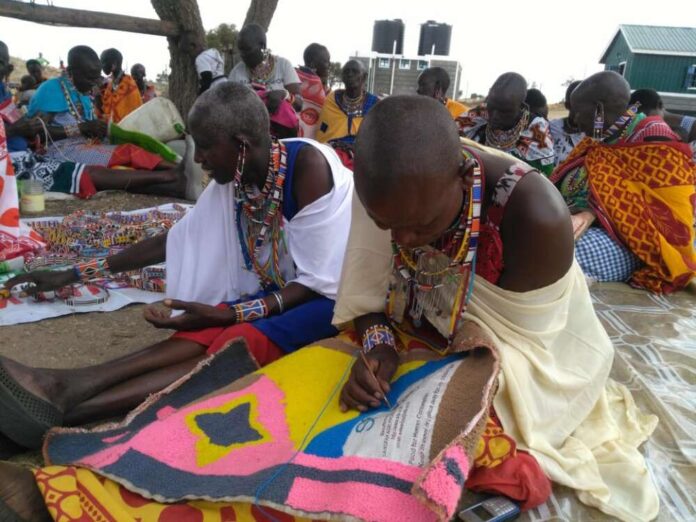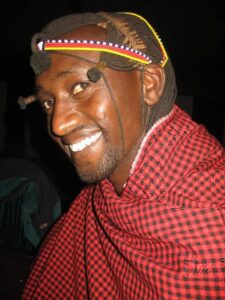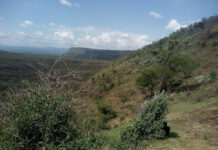
By Christine Wangoi, DevReporter, Kajiado County

Female Genital Mutilation (FGM) is partial or total removal of the external female genitalia for non-medical reasons.
Misconceptions about the vice include: it marks a woman’s maturity, it is an identity proof, makes women superior, curbs immorality, among others.
For a moment, Alice Masinte remains silent. The sadness in her smile is evident. She describes the day she underwent FGM as “dull and painful”.
“I vividly recall the fateful day I underwent the cut. I was sandwiched between a lady and another standing on the side just in case any reinforcement to hold down me was needed. The third lady parted my legs and began cutting my genitalia.
“The pain was too much to bear but I was held so tight to even make any move. I bled profusely. The pain was worsened by the cow-dung that was the only medicine available for the wound. I also witnessed four other girls being cut, while I was helplessly wreathing in pain,” narrates Masinte, a survivor of FGM.
Despite the cry and evident pain Masinte and other survivors endured during the cut, the retrogressive practice is still rampant.
According to the Kenya Demographic Health Survey 2022, 15 percent of girls and women aged 15 to 49 have undergone circumcision in Kenya.
Reasons

According to Parsanka Sayiaka, a Maasai Moran advocating against the FGM, lack of education among the elderly men has been a major stumbling block in the fight against the vice.
“FGM should not only be to a discussion topic at conferences. Education on its effects should be taken to the grassroots levels. The elderly men who have been left out in the conversation are key because they influence their entire households in decision-making.
“Arresting the perpetrators when they have already committed the act is not significant. They end up in court, released on bond or cash bail and then go on cutting more girls,” says Parsanka.
Stigma
Joyce Nasieku, a resident of Oiti, Kajiado Central, says she has endured a lot of stigma from her peers for not undergoing the cut.
“Sometimes I regret not undergoing the cut because I face a lot of discrimination from my peers who perceive me as an inferior Maa girl as well as consider me as immature. The stigma is so draining. Some of my friends laugh and ignore my opinions saying I am a lesser Maa compared to them,” she told RB News.
“I do not understand why the locals say the cut reduces the urge for sexual intimacy in teenage girls thus curbing early pregnancies. It is ironic because teen pregnancies are reported among those who have undergone the cut. The fact that they are told that the cut marks maturity, instead encourages teens to engage in premature sexual intercourse at a tender age,” argues Joyce Nthenya, a resident of Kajiado.
Some perpetrators of FGM have remained adamant and continued with the practice, saying that it is a way of earning a living. Although some say that they are aware of the effects of FGM after massive sensitisation, they fear losing their seasonal economic activity.
Medical perspective
Dr. Dennis Miskellar an obstetrician-gynecologist at Kenyatta National Hospital, says female circumcision is a threat to the attainment of Universal Healthcare, a vision 2030 goal.
According to Dr Miskeller, Fistula during childbirth is a major effect of female cut.
“Fistula cases among those who have undergone the cut are rampant. The unprofessional cutters at times interfere with the birth canal and vaginal veins and that is why the survivors are prone to or experience obstructed labour, leading to Fistula,” he said.
Dr. Miskeller adds that if it goes unchecked, Fistula will be a major stumbling block to the entire healthcare system.
“Those who experience Fistula mostly end up being depressed due to stigma and low self-esteem. When such patients isolate themselves instead of seeking treatment they will not adhere or seek other necessary medical care,” he explained.
Dr. Miskeller further states that exposure to HIV/AIDS is also common since cutters use the same unsterilised cutting tools on more than one person, exposing them to risk, adding to the worrying high numbers of HIV infection cases reported in the country.
He encourages those who suffer from Fistula to seek medical treatment, saying correctional surgeries are done in public hospitals for free.
Emerging challenges
Emerging trends now indicate that some pro FGM parents are facilitating cutters to cut toddlers. Others are reported to be traveling to a neighbouring country where the cut is done to avoid arrest.
“Chiefs have been tasked to closely monitor villagers and report any suspicious activities and moves. Any administrator found compromising the fight against the vice endangers his or her work,” says Jude Wesonga, the Kajiado County Commissioner.
Interventions
The anti FGM male champions are embarking on a campaign that includes morans who are now reaching out to men who cannot easily and openly interact with women advocates. Parsanka Suyianka is one of the male champions.
“In the Maasai culture, a man is an authority within the family. Thus, involving men in efforts to combat FGM at grassroots level is long overdue. Educating the cutters about the effects of the FGM practice is paramount. Having them understand the effects of the cut will help them make informed decisions,” says Parsanka.
Most survivors just like Alice Masinte, have embarked on helping to curb the vice through Community Based Organizations (CBOs).
“I want to encourage young girls who have undergone the cut to continue with their education. Their experience may be unfortunate, it should however not be an end to accessing education. Education is important and the girls should be encouraged to continue with school,” Masinte, who now runs a CBO known as Naret Intoyie, says.
Furthermore, availability of rescue centers within the county has been key in saving the girls who manage to run away from the cut. The rescue homes have been key in ensuring the girls access education and reconcile the girls with their families.
No Out of Court Settlement
The government through administration officers has been adamant that FGM perpetrators cannot be allowed to resolve the rising cases out of court.
Arresting parents of the affected girls as accomplices and making them face the wrath of the law, has also been a milestone. Female circumcision was criminalised in Kenya in 2011 through an anti-FGM Act known as The Prohibition of Female Genital Mutilation Act.
“The rule of law is not selective; it applies to all. There are no excuses as to why an FGM accomplice or perpetrator should be spared when found guilty,” emphasised Jude Wesonga, the County Commissioner, Kajiado.
Empowering Cutters
Further, Non-governmental Organisations have embarked on economic empowerment initiatives to boost financial status of the FGM perpetrators to discourage the practices and to woo them into joining the fight against the vice.





